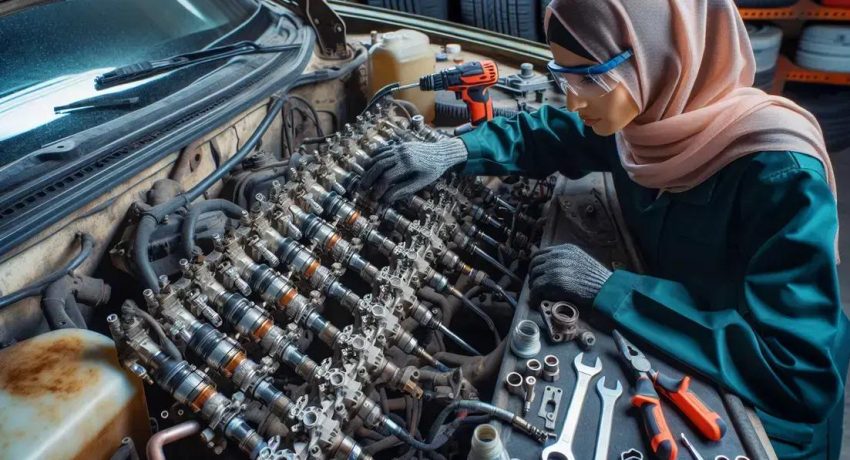When to check fuel injector is essential to maintaining optimal engine performance, with key signs including engine misfires, poor fuel economy, and rough idling indicating potential issues.
Have you ever wondered when to check fuel injector in your vehicle? It’s crucial for maintaining your engine’s efficiency and performance. In this article, we’ll delve into key signs and troubleshooting tips that can save you time and money.
Table of Contents
ToggleSigns your fuel injector needs attention

Recognizing the signs your fuel injector needs attention is vital for maintaining your vehicle’s performance. If you notice any unusual behaviors, it’s important to address them promptly to avoid larger issues.
Symptoms of a Failing Fuel Injector
Some common symptoms include engine misfires, poor fuel economy, or rough idling. If your engine is suddenly stalling or running unevenly, it may indicate that your fuel injectors are not delivering fuel properly. Pay attention to these warnings.
Check Engine Light
Another important indicator is the check engine light. If this light comes on, it may signify problems with your fuel injector. Use an OBD-II scanner to diagnose the issue—it could make all the difference in resolving potential problems early.
Fuel Odor
If you smell fuel, it’s a serious sign that your fuel injectors might be leaking. This can be dangerous and should be examined by a professional immediately. Don’t ignore any unusual petrol smells coming from your vehicle.
Engine Performance Issues
Notice any sluggish acceleration or a decrease in power? This could also be an indication that the fuel injectors are clogged or malfunctioning. Regular maintenance helps keep your injectors clean and functional.
Steps to diagnose fuel injector issues

Diagnosing fuel injector issues requires systematic steps to ensure accurate identification of the problem. Understanding how to approach this can save you time and money.
Step 1: Visual Inspection
Start with a visual inspection of the fuel injectors. Look for any signs of wear, damage, or leakage. Checking for cracks or broken seals is essential. If you see any fuel pooling, this could indicate a problem with the injector.
Step 2: Listen for Noises
Turn on the ignition (without starting the engine) and listen closely. A functioning fuel injector should make a clicking sound. If it’s silent, this may signify a malfunction or electrical issue.
Step 3: Use a Multimeter
Using a multimeter, check the resistance of the fuel injector’s electrical connector. A normal reading is usually between 12 and 16 ohms. If the reading is outside of this range, the injector may be faulty.
Step 4: Fuel Pressure Testing
Test the fuel pressure using a gauge. Start the vehicle and observe the pressure readings. It should match the specifications for your particular make and model. If the pressure is too low or high, it can indicate a fuel injector issue.
Step 5: Cleaning the Injectors
If you suspect clogging, consider using a fuel injector cleaning kit. This can help remove deposits that affect performance. Follow the manufacturer’s instructions carefully to ensure effective cleaning.
Step 6: Professional Diagnosis
If you have followed these steps and still experience issues, consult a professional mechanic. They have specialized tools and expertise to accurately diagnose and repair fuel injector problems.
Understanding Fuel Injector Maintenance
Recognizing when to check your fuel injector is essential for keeping your vehicle running smoothly. By knowing the signs your fuel injector needs attention and following the steps to diagnose fuel injector issues, you can catch problems early and maintain optimal performance.
Regular inspections and timely diagnostics will not only extend the life of your fuel injectors but also enhance your driving experience. Stay proactive and ensure your vehicle remains reliable on the road.
Taking these preventive measures is key to ensuring your engine works efficiently and avoids costly repairs in the future.
FAQ – Frequently Asked Questions about Fuel Injectors
How often should I check my fuel injectors?
It’s recommended to check your fuel injectors during regular vehicle maintenance, ideally every 30,000 miles, or if you notice any symptoms.
What are the signs that my fuel injectors are malfunctioning?
Common signs include engine misfires, poor fuel economy, rough idling, or a check engine light.
Can I clean my fuel injectors at home?
Yes, you can use a fuel injector cleaning kit, which is available at auto parts stores, to safely clean your injectors at home.
Why is it important to diagnose fuel injector issues early?
Early diagnosis can prevent bigger problems, save on costly repairs, and ensure your vehicle maintains peak performance.
Should I consult a professional if I suspect fuel injector issues?
Yes, if you’re unsure or the issue persists after your checks, it’s best to consult a professional mechanic for a thorough diagnosis.
How can I maintain my fuel injectors for better performance?
Regular maintenance, such as using quality fuel, keeping up with oil changes, and periodic cleaning, can help keep your fuel injectors functioning well.






